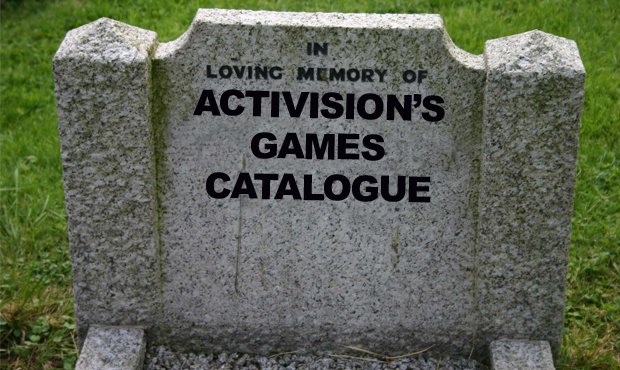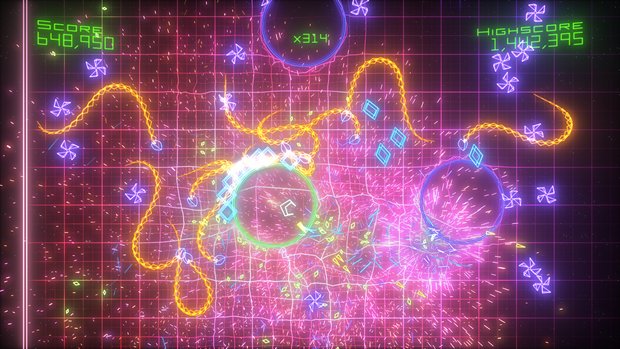How Activision can save its soul
CoD sales aside, Activision is in trouble. But it's not quite too late for a turnaround

It might be the biggest third-party publisher in the world, but Activision has problems. Big problems. And those problems are just the foundation for a whole lot more trouble to come if it doesn’t seriously sort itself out over the next couple of years.
However much Call of Duty sells, however successful the short-term, smash and grab profiteering opportunism of Bobby ‘everyone hates me but I don’t care’ Kotick, things really are not okay over at Activision. In fact it's teetering on the brink of a very messy situation indeed, a situation that could soon see the Activision party crash into a hideous hangover and stumble straight into a brick wall.
But don’t worry. I have solutions.I can make it okay again. I can make it better than it was before. Read on, and I'll detail the current horrors and the future fixes.
Activision%26rsquo;sline-up is a shadow of what it once was
Activision is big for a reason. And that reason is the same that supports the success of any big game publisher. A wide and eclectic portfolio of strong franchises and a healthy cultivation of new ideas. Or at least thatwasthe case in the old days. The current state of play is very different.

Looking back at the line-up that got Activision to where it is now, you’ll find a stellar collection of series and one-off games spanning several decades. Tony Hawk’s. Call of Duty. Guitar Hero. The Spider-man movie games. Prototype. The majority of id Software games stretching back to ports of the original Doom. Geometry Wars. A stack of Star Trek stuff. The Star Wars Jedi Knight franchise. Soldier of Fortune. Tenchu. The Enemy Territory series. It’s a handsome selection.
But now? Call of Duty is still rocking the monster sales, but Guitar Hero isrunning on fumes(latest entry Warriors of Rock sold just 86, 000 in its first week over three formats, contrasting with GH On Tour's 500, 000), and all attempted Hero spin-offs have failed. Bethesda now owns id, so that line’s out. The Spider-Man games have long since lost their way, and Lucasarts is handling Star Wars on its own. The Star Trek license has gone. Tony Hawk has been progressively smashed into the ground with uninspired sequels and is now nothing more than a novelty peripheral-based toy that no-one buys. Original Soldier of Fortune dev Raven is still with Activision, but is being utterly stifled. And that leads me on to my next point. But essentially, aside from onemegaton franchise, Activision ain't got much worth shouting about.
It has wasted all of its dev talentover recent years
Activision used to have a killer line-up of developers on its books, and it bloody well knew how to get the best out of them. Now only the first half of that scenario is true.
Sign up to the GamesRadar+ Newsletter
Weekly digests, tales from the communities you love, and more

Above: Spielberg. Wedding photos. We're talking about that level of wasted talent
For all of the licenses and titles Activision has lost over the years,it’s always been in possession of the talent to replace them. It has Raven, one of the most stalwart and consistently reliable developers in FPS. Raven created the groundbreaking Soldier of Fortune franchise and produced two very successful games for it. But that was when Raven’s talent was nurtured and allowed to breathe. The studio has recently been treated as a poor relation, downsized repeatedly and having had its recent stunner Singularity crushed by a dearth of marketing.
Activision has Neversoft, original developer of the utterly fantastic Tony Hawk’s series. But it ground that franchise into the dirt with needless demands for yearly sequels and then turned its talented creator into nothing more than a maintenance worker on the endless, thanklessGuitar Hero production line. On the subject of music games, Activision also owns FreeStyle Games, creator of the innovative and rather marvellous DJ Hero series, which has sadly never seen the success it deserves.

Above: I know what you're thinking. Now those boys need a tossed out film license
And it just about still owns Bizarre Creations, the corkingly talented bunch behind Metropolis Street Racer, the Project Gotham Racing series and the Geometry Wars games. But Bizarre was put on a “mature” kart racer by the name of Blur, which suffered from a muddled basic concept and poor marketing. After that, Activision handed Bizarre the totally unsuitable poison chalice of the Bond license, farted out its game, Blood Stone, with minimal fanfare, and now has the studio flagged up for closure or sale.
Slip your brain into a parallel universe for a moment. Do you see how different it could be right now if Activision had spent the last few years letting this talentdevelop new ideas instead of smashing its collective faceinto the bloodied brickwall of banal franchise fuel? If it had had enough faith insaid talent'sabilities to let it produce new IPs, and had then marketed those new games with pride and confidence? If that had happened, well, then we’d have a fantastic situation. Activision’s shareholders would be happy, its developers would be happy, and we as gamers would be very happy.
But it didn’t do that. Why? I’ll tell you why
However much Call of Duty sells, however successful the short-term, smash and grab profiteering opportunism of Bobby ‘everyone hates me but I don’t care’ Kotick, things really are not okay over at Activision. In fact it's teetering on the brink of a very messy situation indeed, a situation that could soon see the Activision party crash into a hideous hangover and stumble straight into a brick wall.
But don’t worry. I have solutions.I can make it okay again. I can make it better than it was before. Read on, and I'll detail the current horrors and the future fixes.
Activision%26rsquo;sline-up is a shadow of what it once was
Activision is big for a reason. And that reason is the same that supports the success of any big game publisher. A wide and eclectic portfolio of strong franchises and a healthy cultivation of new ideas. Or at least thatwasthe case in the old days. The current state of play is very different.

Looking back at the line-up that got Activision to where it is now, you’ll find a stellar collection of series and one-off games spanning several decades. Tony Hawk’s. Call of Duty. Guitar Hero. The Spider-man movie games. Prototype. The majority of id Software games stretching back to ports of the original Doom. Geometry Wars. A stack of Star Trek stuff. The Star Wars Jedi Knight franchise. Soldier of Fortune. Tenchu. The Enemy Territory series. It’s a handsome selection.
But now? Call of Duty is still rocking the monster sales, but Guitar Hero isrunning on fumes(latest entry Warriors of Rock sold just 86, 000 in its first week over three formats, contrasting with GH On Tour's 500, 000), and all attempted Hero spin-offs have failed. Bethesda now owns id, so that line’s out. The Spider-Man games have long since lost their way, and Lucasarts is handling Star Wars on its own. The Star Trek license has gone. Tony Hawk has been progressively smashed into the ground with uninspired sequels and is now nothing more than a novelty peripheral-based toy that no-one buys. Original Soldier of Fortune dev Raven is still with Activision, but is being utterly stifled. And that leads me on to my next point. But essentially, aside from onemegaton franchise, Activision ain't got much worth shouting about.
It has wasted all of its dev talentover recent years
Activision used to have a killer line-up of developers on its books, and it bloody well knew how to get the best out of them. Now only the first half of that scenario is true.

Above: Spielberg. Wedding photos. We're talking about that level of wasted talent
For all of the licenses and titles Activision has lost over the years,it’s always been in possession of the talent to replace them. It has Raven, one of the most stalwart and consistently reliable developers in FPS. Raven created the groundbreaking Soldier of Fortune franchise and produced two very successful games for it. But that was when Raven’s talent was nurtured and allowed to breathe. The studio has recently been treated as a poor relation, downsized repeatedly and having had its recent stunner Singularity crushed by a dearth of marketing.
Activision has Neversoft, original developer of the utterly fantastic Tony Hawk’s series. But it ground that franchise into the dirt with needless demands for yearly sequels and then turned its talented creator into nothing more than a maintenance worker on the endless, thanklessGuitar Hero production line. On the subject of music games, Activision also owns FreeStyle Games, creator of the innovative and rather marvellous DJ Hero series, which has sadly never seen the success it deserves.

Above: I know what you're thinking. Now those boys need a tossed out film license
And it just about still owns Bizarre Creations, the corkingly talented bunch behind Metropolis Street Racer, the Project Gotham Racing series and the Geometry Wars games. But Bizarre was put on a “mature” kart racer by the name of Blur, which suffered from a muddled basic concept and poor marketing. After that, Activision handed Bizarre the totally unsuitable poison chalice of the Bond license, farted out its game, Blood Stone, with minimal fanfare, and now has the studio flagged up for closure or sale.
Slip your brain into a parallel universe for a moment. Do you see how different it could be right now if Activision had spent the last few years letting this talentdevelop new ideas instead of smashing its collective faceinto the bloodied brickwall of banal franchise fuel? If it had had enough faith insaid talent'sabilities to let it produce new IPs, and had then marketed those new games with pride and confidence? If that had happened, well, then we’d have a fantastic situation. Activision’s shareholders would be happy, its developers would be happy, and we as gamers would be very happy.
But it didn’t do that. Why? I’ll tell you why



